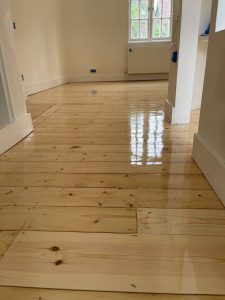
Floor sanding is not only essential for residential spaces but also plays a crucial role in maintaining and enhancing the appearance of commercial properties. In a bustling city like London, the aesthetics and durability of your commercial flooring can significantly impact the perception of your business. Here’s what you need to know about floor sanding for commercial properties.
- Importance of Floor Sanding in Commercial Spaces
First Impressions:
- Professional Appearance: Well-maintained floors create a positive first impression for clients, customers, and visitors. Sanding can restore the beauty and elegance of your floors, reflecting the professionalism of your business.
Safety and Hygiene:
- Smooth Surface: Sanding removes splinters, uneven surfaces, and old finishes that can pose safety hazards. A smooth, well-finished floor is safer for foot traffic.
- Cleanliness: Sanded and sealed floors are easier to clean and maintain, ensuring a hygienic environment, especially important in places like restaurants and medical facilities.
- Types of Commercial Properties Benefiting from Floor Sanding
Offices:
- Durability: Office floors endure heavy foot traffic. Sanding and refinishing can extend the life of your flooring, maintaining a professional look.
Retail Stores:
- Aesthetic Appeal: Attractive floors enhance the shopping experience and can influence customer behaviour. Regular maintenance, including sanding, keeps your retail space inviting.
Restaurants and Cafés:
- Hygiene: In food service environments, maintaining clean and sanitary floors is paramount. Sanding and sealing floors make them easier to clean and less likely to harbour bacteria.
Hotels and Hospitality:
- Luxury Feel: Well-maintained wooden floors contribute to the luxurious feel of hotels and hospitality venues. Regular sanding ensures that the flooring remains in top condition, impressing guests.
- Choosing the Right Time for Sanding

Minimising Disruption:
- Off-Peak Hours: Schedule sanding during off-peak hours or holidays to minimise disruption to your business operations. Nighttime or weekend work might be necessary for 24-hour operations.
- Short Downtime: Modern sanding techniques and fast-drying finishes can significantly reduce downtime, allowing your business to resume normal operations quickly.
- Selecting the Right Finish
Durable Finishes:
- High Traffic: Choose durable finishes like commercial-grade polyurethane, which can withstand heavy foot traffic and daily wear and tear.
- Slip Resistance: In certain environments, such as restaurants or retail stores, a slip-resistant finish is crucial for safety.
Aesthetic Choices:
- Customisation: Depending on your brand and interior design, you might opt for a specific stain or finish that complements your overall aesthetic.
- Hiring Professional Services
Experience Matters:
- Commercial Expertise: Hire professionals who have experience with commercial properties. They will understand the unique challenges and requirements of commercial floor sanding.
- Quality Assurance: Look for companies with good reviews and a portfolio of successful commercial projects.
Maintenance Contracts:
- Ongoing Care: Consider setting up a maintenance contract with your sanding service provider. Regular maintenance and periodic sanding will keep your floors in optimal condition.
- Preparing Your Commercial Space
Clear the Area:
- Move Furniture and Equipment: Ensure that all furniture, equipment, and fixtures are removed or securely covered to protect them from dust and damage.
- Communicate with Staff: Inform your staff about the sanding schedule and any necessary preparations to avoid disruptions.
Dust Control:
- Advanced Equipment: Professional sanding companies use advanced equipment with dust extraction systems to minimise dust and maintain air quality.
- Post-Sanding Care and Maintenance

Regular Cleaning:
- Daily Maintenance: Implement a regular cleaning routine to keep your floors looking their best. Use appropriate cleaning products recommended for your specific finish.
Protective Measures:
- Floor Mats: Place floor mats at entrances to reduce dirt and moisture tracked onto the floors.
- Furniture Pads: Use pads under furniture legs to prevent scratches and dents.
Conclusion
Floor sanding is an essential maintenance task for commercial properties in London, enhancing both aesthetics and functionality. By choosing the right time, finishes, and professional services, you can ensure that your commercial space remains inviting, safe, and durable. Proper preparation and ongoing maintenance will help you maximise the lifespan and appearance of your floors, creating a positive impact on your business environment.
Investing in professional floor sanding for your commercial property is a smart decision that pays off in improved appearance, safety, and longevity. Whether you manage an office, retail store, restaurant, or hotel, well-maintained floors are a key component of a successful business.

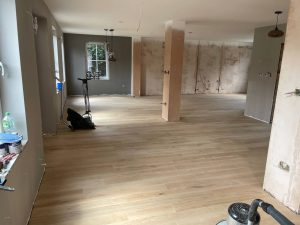
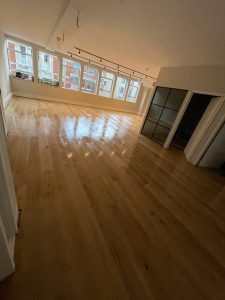
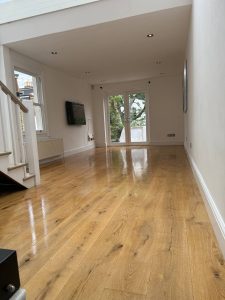
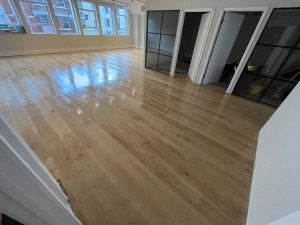

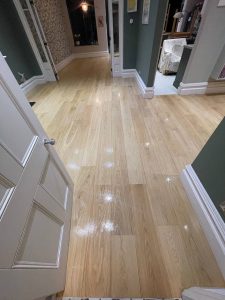
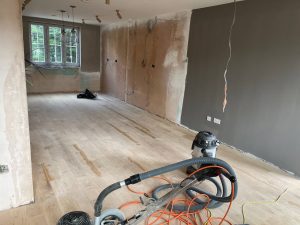

Customer Testimonials: Real Stories of Floor Sanding Success
Hearing from satisfied customers is one of the best ways to understand the value and[Read more...]
Floor Sanding for Stairs: Techniques and Tips
Floor Sanding for Stairs: Techniques and Tips Enhance the beauty and longevity[Read more...]
What to Expect During a Floor Sanding Project
What to Expect During a Floor Sanding Project Preparing for a Smooth and Successful[Read more...]
The History and Evolution of Floor Sanding Techniques
Floor sanding is a crucial process in maintaining the beauty and longevity of wooden floors.[Read more...]
Wood floor nailing
[Read more...]
How to Create a Vintage Look with Floor Sanding and Finishing
How to Create a Vintage Look with Floor Sanding and Finishing Creating a vintage[Read more...]
How to Choose the Perfect Finish for Your Sanded Floors
Choosing the perfect finish for your sanded floors is a crucial decision that can significantly[Read more...]
How to Choose the Right Sandpaper for Floor Sanding
How to Choose the Right Sandpaper for Floor Sanding Ensure a Smooth and Professional[Read more...]
The Role of Floor Sanding in Property Management
The Role of Floor Sanding in Property Management Introduction Property management involves a wide[Read more...]
Floor Board Restoration
Restoration Whilst you may believe that floor sanding itself is classed as restoration, floor restoration[Read more...]